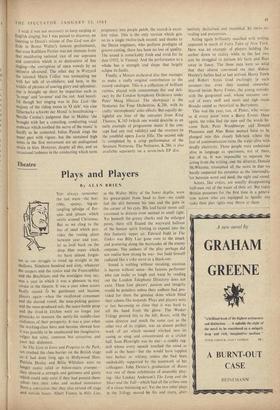Theatre
Plays and Players
By ALAN BRIEN You always remember the last wave--the hor- rible, spumy, leg-en- tangling splodge of flot- sam and jetsam which swirls around Christmas. But as we cling to the bar of sand which pro- vides the resting place between year and year, let us look back on the deep blue water which we have almost forgot- ten in our struggle to stand up straight in the Shallows. Nineteen hundred and sixty, whatever the carpers and the cynics and the Francophiles and the Brechtians and the nostalgics may say, was a year in which it vb'as a pleasure NI stay awake in the theatre. It was a year when actors finally ceased ra be gentlemen and became Players again--when the swallowed consonant and the slurred vowel, the nose-picking gesture and the mass-produced suit, the sauce-bottle prop and the lived-in kitchen were no longer just gimmicks to reassure the newly-fat middle-class audiences of their prosperity. It was a year when the working-class hero and heroine showed how it was possible to be uneducated but imaginative. vulgar but witty, common but attractive, and Poor but dishonest.
In The Lion in Love and Progress to the Park. sex crashed the class barrier on the British stage as it had done long ago in Hollywood films. Patricia Healey and Billie Whitelaw were no longer comic relief or below-stairs crumpet.- - they showed a strength and gutsiness and gaiety Which could only exist if they had poured them- selves into their roles and sucked sustenance from a conviction that they also existed off stage and outside hours. Albert Finney in Billy Liar, as the Walter Mitty of the lower depths, wore his grease-paint from head to foot—we could feel the dirt between his toes and the gum in the corner of his eyes. His loaf-faced moon calf cocooned in dreams even seemed to smell right. Yet beneath the greasy cheeks and the enlarged pores, there still floated the wayward balloon of the human spirit fretting to expand into the thin fantastic upper air. Edward Judd in The Tinker was Billy Liar gone over to the attack and posturing along the barricades of the enemy outposts. The authors of the play perhaps did not realise how strong he was—but Judd himself radiated like a coke stove in a black-out.
Sound is nothing without meaning, emotion is barren without sense—the famous performer who can make us laugh and weep by reading out the London Telephone Directory does not exist. These four players' passion and integrity would be pointless unless their authors had pro- vided for them the genuine skins which fitted their talents like leopards. Plays and players were at last becoming so close that it was hard to tell the hand from the glove. The Wcsker Trilogy proved this to the hilt. Roots, with the same director and much the same cast as the other two of its triplets, was an almost perfect work of art which seemed stitched into its casing as snug and concentrated as a cricket ball. Joan Plowright was its star—a cuddly rag- doll whose every squeak touched the mind as well as the heart--but she would have toppled into bathos or whimsy unless she had been unshakably supported by the teamwork of her colleagues. John Dexter's production of Rotns was one of those exhibitions of ensemble plas- ing- -like Lindsay Anderson's The Long and thc Short and the Tall—which had all the artless ease of a circus balancing act. Yet the two other plass in the Trilogy moved by fits and starts, alter-
natively declaimed and mumbled, by turns re- vealing and pretentious.
Acting again brilliantly matched with writing appeared in much of Fairy Tales of New York. Here was an example of players holding the author down to reality while in the last two acts he struggled to jettison his facts and float away in fancy. The three men were so solid that they almost convinced me that Aldous Huxley's feelies had at last arrived. Harry Towb and Robert Ayres lived excitingly in each moment—but even they seemed somewhat blurred beside Barry Foster, the young outside; with the gangrened soul, whose uncanny con • trol of every sniff and snort and sigh made Brand° sound as rhetorical as Barrymore.
This was the year, too, of Pinter, who writes as if every actor were a Barry Foster. Once again, the roles find the men and the words be- come flesh. Peter Woodthorpe and Donald Pleasance and Alan Bates seemed born to be plunged into this cloudy fish-tank where the fear of communication turns the water alive with deadly electricity. Three people were embalmed alive in language as specimens, not of them, .but of tis. It was impossible to separate the acting from the writing, and the director, Donald McWhinnie, triumphed all the more in that we barely suspected his existence as the intermedia- tor between word and deed, the sight and sound.
Actors, like critics. are usually disappointing half-men out of the water of their art. But today Britain possesses for .the first time in a genera- tion actors who are equipped to handle any tasks their play:ights may throw at them.


































 Previous page
Previous page